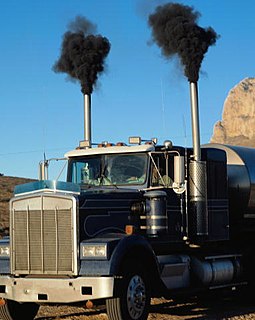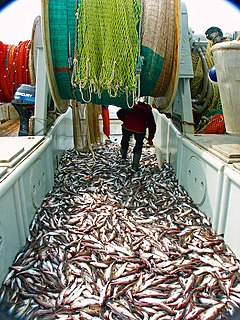In economics, a privileged group is one possible condition for the production of public goods.
A privileged group contains at least one individual that benefits more from a public good than its production costs. Therefore, the good will be produced although other members of the group benefit without paying. However, this free rider problem may still result in an undersupply of the good compared to the Lindahl equilibrium.
In economics, factors of production, resources, or inputs are what is used in the production process to produce output—that is, finished goods and services. The utilized amounts of the various inputs determine the quantity of output according to the relationship called the production function. There are four basic resources or factors of production: land, labour, capital and entrepreneur. The factors are also frequently labeled "producer goods or services" to distinguish them from the goods or services purchased by consumers, which are frequently labeled "consumer goods".
Public choice, or public choice theory, is "the use of economic tools to deal with traditional problems of political science". Its content includes the study of political behavior. In political science, it is the subset of positive political theory that studies self-interested agents and their interactions, which can be represented in a number of ways – using standard constrained utility maximization, game theory, or decision theory. It is the origin and intellectual foundation of contemporary work in political economy.
In the social sciences, the free-rider problem is a type of market failure that occurs when those who benefit from resources, public goods, or services of a communal nature do not pay for them or under-pay. Free riders are a problem because while not paying for the good, they may continue to access or consume it. Thus, the good may be under-produced, overused or degraded. Additionally, it has been shown that despite evidence that people tend to be cooperative by nature, the presence of free-riders cause this prosocial behaviour to deteriorate, perpetuating the free-rider problem.

In economics, an externality or external cost is an indirect cost or benefit to an uninvolved third party that arises as an effect of another party's activity. Externalities can be considered as unpriced goods involved in either consumer or producer market transactions. Air pollution from motor vehicles is one example. The cost of air pollution to society is not paid by either the producers or users of motorized transport to the rest of society. Water pollution from mills and factories is another example. All consumers are all made worse off by pollution but are not compensated by the market for this damage. A positive externality is when an individual's consumption in a market increases the well-being of others, but the individual does not charge the third party for the benefit. The third party is essentially getting a free product. An example of this might be the apartment above a bakery receiving the benefit of enjoyment from smelling fresh pastries every morning. The people who live in the apartment do not compensate the bakery for this benefit.

In economics, a public good is a good that is both non-excludable and non-rivalrous. For such goods, users cannot be barred from accessing or using them for failing to pay for them. Also, use by one person neither prevents access of other people nor does it reduce availability to others. Therefore, the good can be used simultaneously by more than one person. This is in contrast to a common good, such as wild fish stocks in the ocean, which is non-excludable but rivalrous to a certain degree. If too many fish were harvested, the stocks would deplete, limiting the access of fish for others. A public good must be valuable to more than one user, otherwise, the fact that it can be used simultaneously by more than one person would be economically irrelevant.

Collective action refers to action taken together by a group of people whose goal is to enhance their condition and achieve a common objective. It is a term that has formulations and theories in many areas of the social sciences including psychology, sociology, anthropology, political science and economics.
In philosophy, economics, and political science, the common good refers to either what is shared and beneficial for all or most members of a given community, or alternatively, what is achieved by citizenship, collective action, and active participation in the realm of politics and public service. The concept of the common good differs significantly among philosophical doctrines. Early conceptions of the common good were set out by Ancient Greek philosophers, including Aristotle and Plato. One understanding of the common good rooted in Aristotle's philosophy remains in common usage today, referring to what one contemporary scholar calls the "good proper to, and attainable only by, the community, yet individually shared by its members."

State ownership, also called government ownership and public ownership, is the ownership of an industry, asset, or enterprise by the state or a public body representing a community, as opposed to an individual or private party. Public ownership specifically refers to industries selling goods and services to consumers and differs from public goods and government services financed out of a government's general budget. Public ownership can take place at the national, regional, local, or municipal levels of government; or can refer to non-governmental public ownership vested in autonomous public enterprises. Public ownership is one of the three major forms of property ownership, differentiated from private, collective/cooperative, and common ownership.

In economics, a good is said to be rivalrous or a rival if its consumption by one consumer prevents simultaneous consumption by other consumers, or if consumption by one party reduces the ability of another party to consume it. A good is considered non-rivalrous or non-rival if, for any level of production, the cost of providing it to a marginal (additional) individual is zero. A good is "anti-rivalrous" and "inclusive" if each person benefits more when other people consume it.

Club goods are a type of good in economics, sometimes classified as a subtype of public goods that are excludable but non-rivalrous, at least until reaching a point where congestion occurs. Often these goods exhibit high excludability, but at the same time low rivalry in consumption. Thus, club goods have essentially zero marginal costs and are generally provided by what is commonly known as natural monopolies. Furthermore, club goods have artificial scarcity. Club theory is the area of economics that studies these goods. One of the most famous provisions was published by Buchanan in 1965 "An Economic Theory of Clubs," in which he addresses the question of how the size of the group influences the voluntary provision of a public good and more fundamentally provides a theoretical structure of communal or collective ownership-consumption arrangements.

Mançur Lloyd Olson Jr. was an American economist and political scientist who taught at the University of Maryland, College Park. His most influential contributions were in institutional economics, and in the role which private property, taxation, public goods, collective action, and contract rights play in economic development.

The public goods game is a standard of experimental economics. In the basic game, subjects secretly choose how many of their private tokens to put into a public pot. The tokens in this pot are multiplied by a factor and this "public good" payoff is evenly divided among players. Each subject also keeps the tokens they do not contribute.
An assurance contract, also known as a provision point mechanism, or crowdaction, is a game-theoretic mechanism and a financial technology that facilitates the voluntary creation of public goods and club goods in the face of collective action problems such as the free rider problem.
In economics, a common-pool resource (CPR) is a type of good consisting of a natural or human-made resource system, whose size or characteristics makes it costly, but not impossible, to exclude potential beneficiaries from obtaining benefits from its use. Unlike pure public goods, common pool resources face problems of congestion or overuse, because they are subtractable. A common-pool resource typically consists of a core resource, which defines the stock variable, while providing a limited quantity of extractable fringe units, which defines the flow variable. While the core resource is to be protected or nurtured in order to allow for its continuous exploitation, the fringe units can be harvested or consumed.
The Logic of Collective Action: Public Goods and the Theory of Groups is a book by Mancur Olson, Jr. published in 1965. It develops a theory of political science and economics of concentrated benefits versus diffuse costs. Its central argument is that concentrated minor interests will be overrepresented and diffuse majority interests trumped, due to a free-rider problem that is stronger when a group becomes larger.

Common goods are defined in economics as goods that are rivalrous and non-excludable. Thus, they constitute one of the four main types based on the criteria:
A collective action problem or social dilemma is a situation in which all individuals would be better off cooperating but fail to do so because of conflicting interests between individuals that discourage joint action. The collective action problem has been addressed in political philosophy for centuries, but was most clearly established in 1965 in Mancur Olson's The Logic of Collective Action.
Property rights have developed over ancient and modern history, from Abrahamic law to today's Universal Declaration of Human Rights article 17. Property rights can be understood as constructs in economics for determining how a resource or economic good is used and owned. Resources can be owned by individuals, associations, collectives, or governments. Property rights can be viewed as an attribute of an economic good. This attribute has three broad components and is often referred to as a bundle of rights in the United States:
Public economics is the study of government policy through the lens of economic efficiency and equity. Public economics builds on the theory of welfare economics and is ultimately used as a tool to improve social welfare.
This glossary of economics is a list of definitions of terms and concepts used in economics, its sub-disciplines, and related fields.